Unit 5 What were you doing when the rainstorm came知识清单导学案-2025人教版英语八年级下册(含答案)
文档属性
| 名称 | Unit 5 What were you doing when the rainstorm came知识清单导学案-2025人教版英语八年级下册(含答案) |
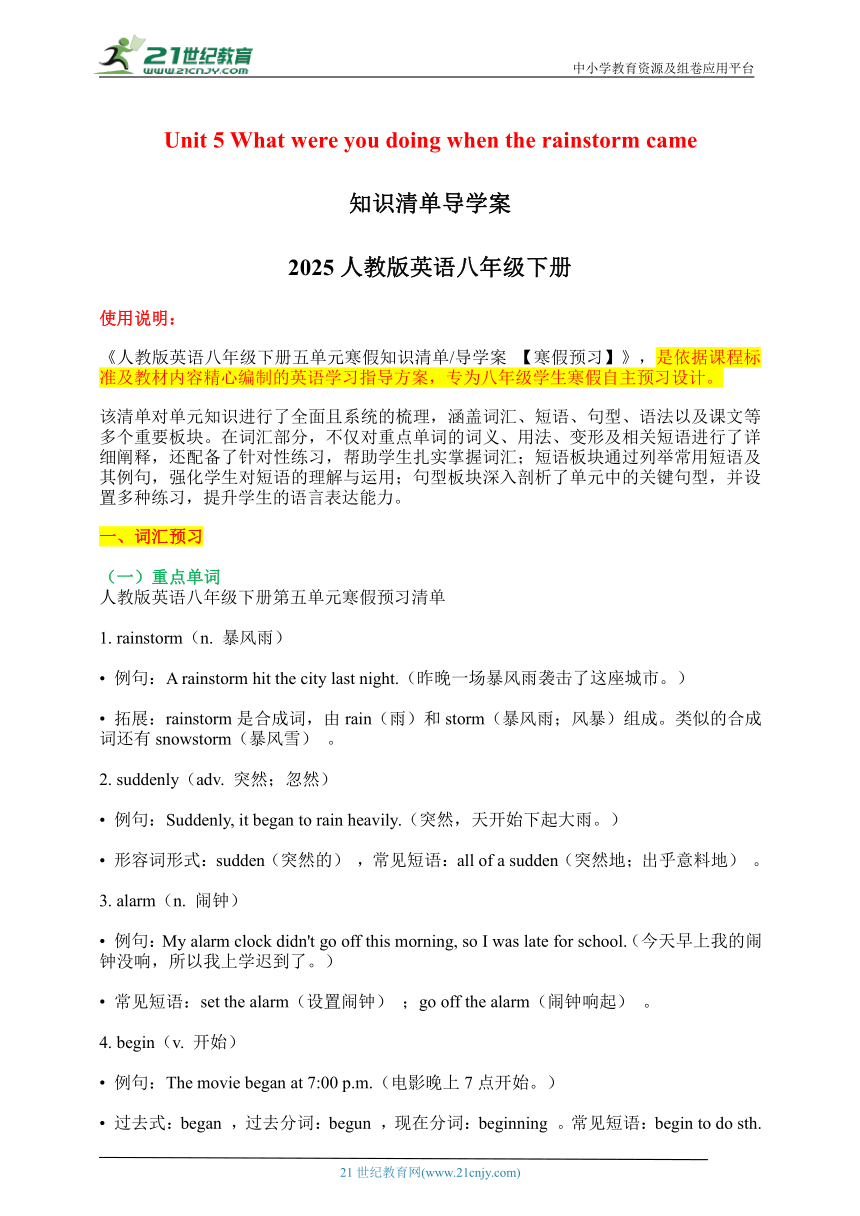
|
|
| 格式 | doc | ||
| 文件大小 | 290.1KB | ||
| 资源类型 | 试卷 | ||
| 版本资源 | 人教新目标(Go for it)版 | ||
| 科目 | 英语 | ||
| 更新时间 | 2025-02-28 00:00:00 | ||
图片预览

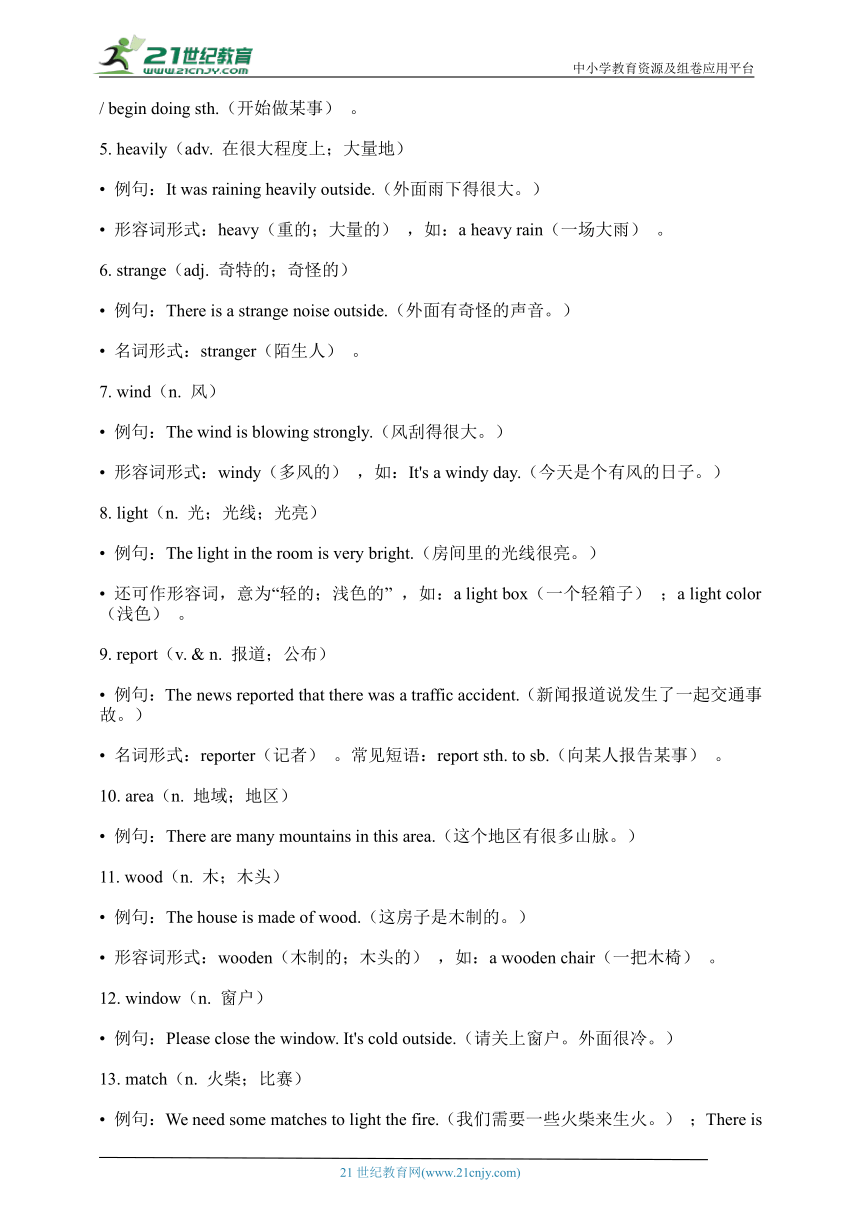
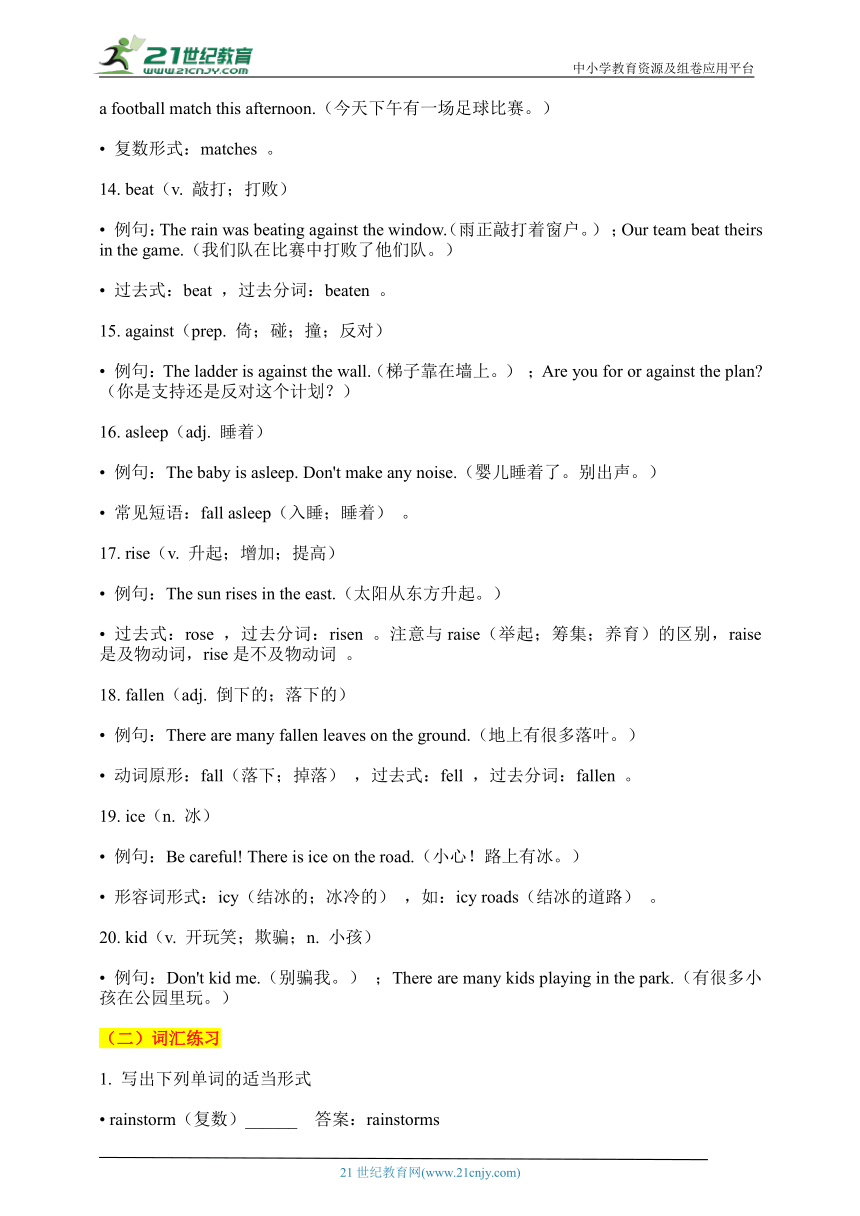
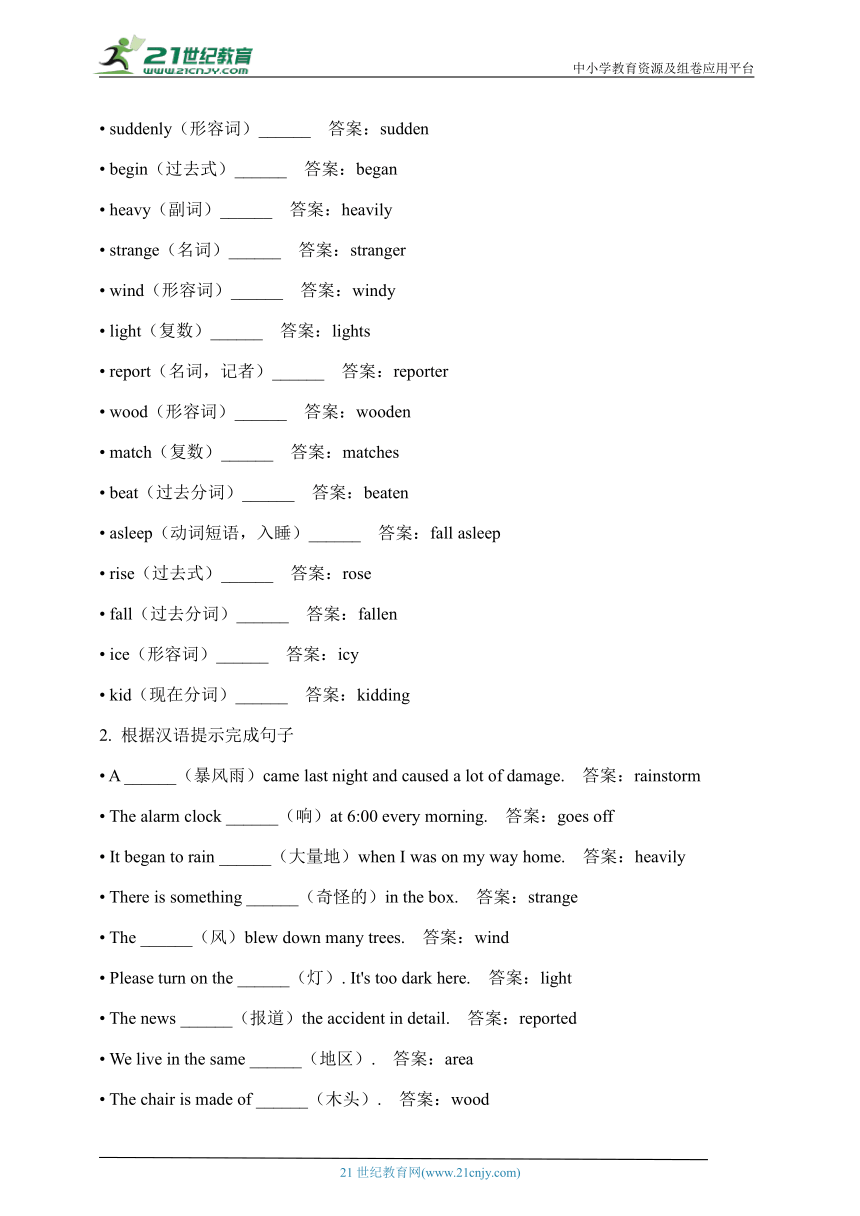
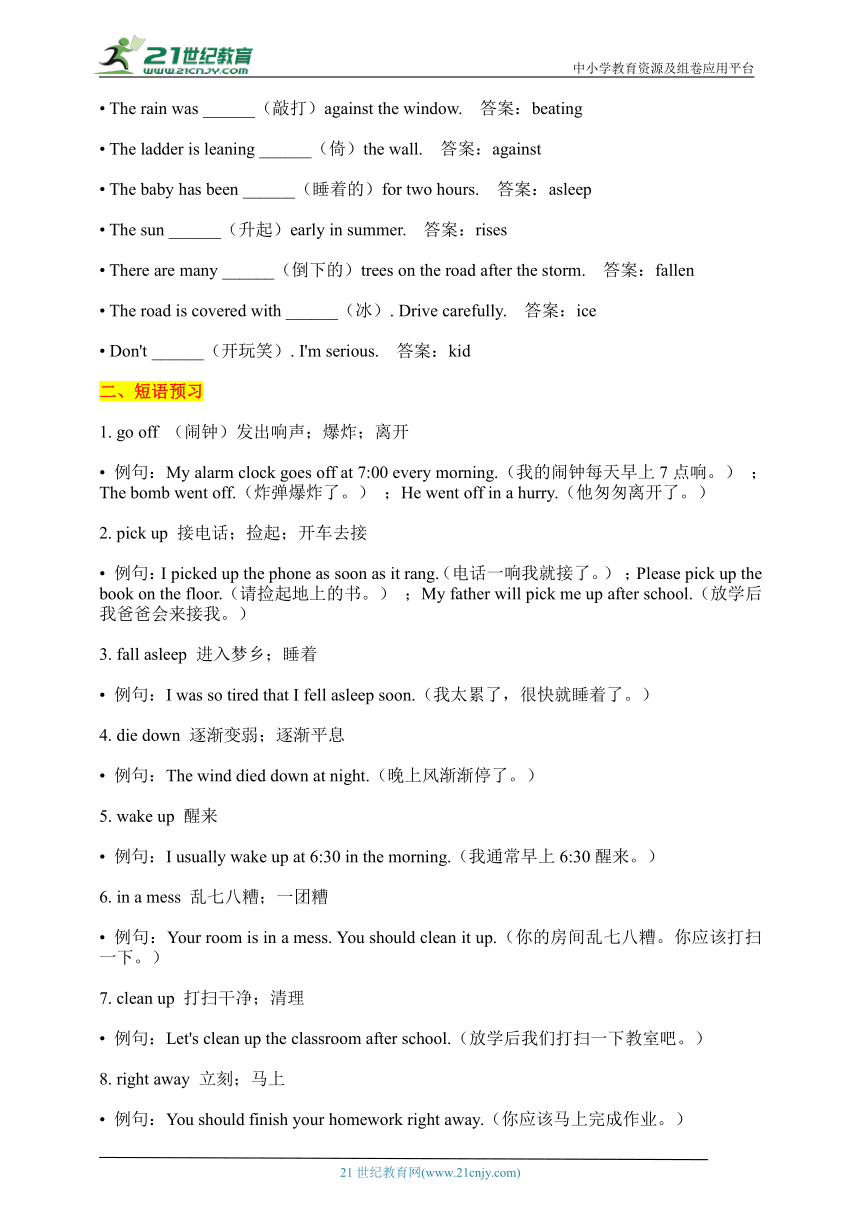
文档简介
中小学教育资源及组卷应用平台
Unit 5 What were you doing when the rainstorm came
知识清单导学案
2025人教版英语八年级下册
使用说明:
《人教版英语八年级下册五单元寒假知识清单/导学案 【寒假预习】》,是依据课程标准及教材内容精心编制的英语学习指导方案,专为八年级学生寒假自主预习设计。
该清单对单元知识进行了全面且系统的梳理,涵盖词汇、短语、句型、语法以及课文等多个重要板块。在词汇部分,不仅对重点单词的词义、用法、变形及相关短语进行了详细阐释,还配备了针对性练习,帮助学生扎实掌握词汇;短语板块通过列举常用短语及其例句,强化学生对短语的理解与运用;句型板块深入剖析了单元中的关键句型,并设置多种练习,提升学生的语言表达能力。
一、词汇预习
(一)重点单词
人教版英语八年级下册第五单元寒假预习清单
1. rainstorm(n. 暴风雨)
例句:A rainstorm hit the city last night.(昨晚一场暴风雨袭击了这座城市。)
拓展:rainstorm是合成词,由rain(雨)和storm(暴风雨;风暴)组成。类似的合成词还有snowstorm(暴风雪) 。
2. suddenly(adv. 突然;忽然)
例句:Suddenly, it began to rain heavily.(突然,天开始下起大雨。)
形容词形式:sudden(突然的) ,常见短语:all of a sudden(突然地;出乎意料地) 。
3. alarm(n. 闹钟)
例句:My alarm clock didn't go off this morning, so I was late for school.(今天早上我的闹钟没响,所以我上学迟到了。)
常见短语:set the alarm(设置闹钟) ;go off the alarm(闹钟响起) 。
4. begin(v. 开始)
例句:The movie began at 7:00 p.m.(电影晚上7点开始。)
过去式:began ,过去分词:begun ,现在分词:beginning 。常见短语:begin to do sth. / begin doing sth.(开始做某事) 。
5. heavily(adv. 在很大程度上;大量地)
例句:It was raining heavily outside.(外面雨下得很大。)
形容词形式:heavy(重的;大量的) ,如:a heavy rain(一场大雨) 。
6. strange(adj. 奇特的;奇怪的)
例句:There is a strange noise outside.(外面有奇怪的声音。)
名词形式:stranger(陌生人) 。
7. wind(n. 风)
例句:The wind is blowing strongly.(风刮得很大。)
形容词形式:windy(多风的) ,如:It's a windy day.(今天是个有风的日子。)
8. light(n. 光;光线;光亮)
例句:The light in the room is very bright.(房间里的光线很亮。)
还可作形容词,意为“轻的;浅色的” ,如:a light box(一个轻箱子) ;a light color(浅色) 。
9. report(v. & n. 报道;公布)
例句:The news reported that there was a traffic accident.(新闻报道说发生了一起交通事故。)
名词形式:reporter(记者) 。常见短语:report sth. to sb.(向某人报告某事) 。
10. area(n. 地域;地区)
例句:There are many mountains in this area.(这个地区有很多山脉。)
11. wood(n. 木;木头)
例句:The house is made of wood.(这房子是木制的。)
形容词形式:wooden(木制的;木头的) ,如:a wooden chair(一把木椅) 。
12. window(n. 窗户)
例句:Please close the window. It's cold outside.(请关上窗户。外面很冷。)
13. match(n. 火柴;比赛)
例句:We need some matches to light the fire.(我们需要一些火柴来生火。) ;There is a football match this afternoon.(今天下午有一场足球比赛。)
复数形式:matches 。
14. beat(v. 敲打;打败)
例句:The rain was beating against the window.(雨正敲打着窗户。) ;Our team beat theirs in the game.(我们队在比赛中打败了他们队。)
过去式:beat ,过去分词:beaten 。
15. against(prep. 倚;碰;撞;反对)
例句:The ladder is against the wall.(梯子靠在墙上。) ;Are you for or against the plan (你是支持还是反对这个计划?)
16. asleep(adj. 睡着)
例句:The baby is asleep. Don't make any noise.(婴儿睡着了。别出声。)
常见短语:fall asleep(入睡;睡着) 。
17. rise(v. 升起;增加;提高)
例句:The sun rises in the east.(太阳从东方升起。)
过去式:rose ,过去分词:risen 。注意与raise(举起;筹集;养育)的区别,raise是及物动词,rise是不及物动词 。
18. fallen(adj. 倒下的;落下的)
例句:There are many fallen leaves on the ground.(地上有很多落叶。)
动词原形:fall(落下;掉落) ,过去式:fell ,过去分词:fallen 。
19. ice(n. 冰)
例句:Be careful! There is ice on the road.(小心!路上有冰。)
形容词形式:icy(结冰的;冰冷的) ,如:icy roads(结冰的道路) 。
20. kid(v. 开玩笑;欺骗;n. 小孩)
例句:Don't kid me.(别骗我。) ;There are many kids playing in the park.(有很多小孩在公园里玩。)
(二)词汇练习
1. 写出下列单词的适当形式
rainstorm(复数)______ 答案:rainstorms
suddenly(形容词)______ 答案:sudden
begin(过去式)______ 答案:began
heavy(副词)______ 答案:heavily
strange(名词)______ 答案:stranger
wind(形容词)______ 答案:windy
light(复数)______ 答案:lights
report(名词,记者)______ 答案:reporter
wood(形容词)______ 答案:wooden
match(复数)______ 答案:matches
beat(过去分词)______ 答案:beaten
asleep(动词短语,入睡)______ 答案:fall asleep
rise(过去式)______ 答案:rose
fall(过去分词)______ 答案:fallen
ice(形容词)______ 答案:icy
kid(现在分词)______ 答案:kidding
2. 根据汉语提示完成句子
A ______(暴风雨)came last night and caused a lot of damage. 答案:rainstorm
The alarm clock ______(响)at 6:00 every morning. 答案:goes off
It began to rain ______(大量地)when I was on my way home. 答案:heavily
There is something ______(奇怪的)in the box. 答案:strange
The ______(风)blew down many trees. 答案:wind
Please turn on the ______(灯). It's too dark here. 答案:light
The news ______(报道)the accident in detail. 答案:reported
We live in the same ______(地区). 答案:area
The chair is made of ______(木头). 答案:wood
The rain was ______(敲打)against the window. 答案:beating
The ladder is leaning ______(倚)the wall. 答案:against
The baby has been ______(睡着的)for two hours. 答案:asleep
The sun ______(升起)early in summer. 答案:rises
There are many ______(倒下的)trees on the road after the storm. 答案:fallen
The road is covered with ______(冰). Drive carefully. 答案:ice
Don't ______(开玩笑). I'm serious. 答案:kid
二、短语预习
1. go off (闹钟)发出响声;爆炸;离开
例句:My alarm clock goes off at 7:00 every morning.(我的闹钟每天早上7点响。) ;The bomb went off.(炸弹爆炸了。) ;He went off in a hurry.(他匆匆离开了。)
2. pick up 接电话;捡起;开车去接
例句:I picked up the phone as soon as it rang.(电话一响我就接了。) ;Please pick up the book on the floor.(请捡起地上的书。) ;My father will pick me up after school.(放学后我爸爸会来接我。)
3. fall asleep 进入梦乡;睡着
例句:I was so tired that I fell asleep soon.(我太累了,很快就睡着了。)
4. die down 逐渐变弱;逐渐平息
例句:The wind died down at night.(晚上风渐渐停了。)
5. wake up 醒来
例句:I usually wake up at 6:30 in the morning.(我通常早上6:30醒来。)
6. in a mess 乱七八糟;一团糟
例句:Your room is in a mess. You should clean it up.(你的房间乱七八糟。你应该打扫一下。)
7. clean up 打扫干净;清理
例句:Let's clean up the classroom after school.(放学后我们打扫一下教室吧。)
8. right away 立刻;马上
例句:You should finish your homework right away.(你应该马上完成作业。)
9. break...apart 使……分离;把……弄碎
例句:The storm broke the tree apart.(暴风雨把树折断了。)
10. look out of 向……外看
例句:I looked out of the window and saw a beautiful view.(我向窗外望去,看到了美丽的景色。)
11. make one's way 前往;费力地前进
例句:He made his way to the station in the heavy rain.(他在大雨中艰难地向车站走去。)
12. at first 首先;最初
例句:At first, I didn't like the movie, but later I found it interesting.(起初,我不喜欢这部电影,但后来我觉得它很有趣。)
13. fall down 倒下;跌倒;倒塌
例句:The old building fell down in the earthquake.(那座旧建筑在地震中倒塌了。)
14. cut off 切除;切断;中断
例句:The heavy snow cut off the electricity supply.(大雪切断了电力供应。)
15. in times of difficulty 在困难时期
例句:We should help each other in times of difficulty.(在困难时期我们应该互相帮助。)
短语练习
1. 写出下列短语的汉语意思
go off ______ 答案:(闹钟)发出响声;爆炸;离开
pick up ______ 答案:接电话;捡起;开车去接
fall asleep ______ 答案:进入梦乡;睡着
die down ______ 答案:逐渐变弱;逐渐平息
wake up ______ 答案:醒来
in a mess ______ 答案:乱七八糟;一团糟
clean up ______ 答案:打扫干净;清理
right away ______ 答案:立刻;马上
break...apart ______ 答案:使……分离;把……弄碎
look out of ______ 答案:向……外看
make one's way ______ 答案:前往;费力地前进
at first ______ 答案:首先;最初
fall down ______ 答案:倒下;跌倒;倒塌
cut off ______ 答案:切除;切断;中断
in times of difficulty ______ 答案:在困难时期
2. 用适当的短语填空
My alarm clock didn't ______ this morning, so I overslept. 答案:go off
I called you last night, but you didn't ______. 答案:pick up
I was so tired that I ______ soon after I lay down. 答案:fell asleep
The fire ______ after the firefighters arrived. 答案:died down
I usually ______ at 7:00 in the morning. 答案:wake up
Your room is ______. You need to tidy it up. 答案:in a mess
Let's ______ the living room before the guests come. 答案:clean up
You should give back the book to the library ______. 答案:right away
The strong wind ______ the branches from the tree. 答案:broke; apart
I like to ______ the window and enjoy the scenery. 答案:look out of
He ______ to the airport through the crowded streets. 答案:made his way
______, I didn't know how to solve the problem. 答案:At first
Be careful not to ______ on the icy road. 答案:fall down
The earthquake ______ the water supply. 答案:cut off
We should stay calm ______. 答案:in times of difficulty
三、句型预习
1. What were you doing at eight last night
例句:What were you doing at eight last night I was doing my homework.(你昨晚8点在做什么?我在做作业。)
用法:这是过去进行时的特殊疑问句,用来询问过去某个时间点某人正在做什么。过去进行时的结构是“was/were + 动词的现在分词” ,表示过去某个时刻正在进行的动作 。
2. While the girl was shopping, the alien got out.
例句:While the boy was reading, his mother came back.(当男孩在读书时,他妈妈回来了。)
用法:while引导时间状语从句,强调主从句的动作同时发生,从句中常用延续性动词,且常用过去进行时 。主句的时态根据具体情况而定 。
3. When the rainstorm came, what were you doing
例句:When I got home, my sister was watching TV.(当我到家时,我妹妹正在看电视。)
用法:when引导时间状语从句,既可以表示主句和从句的动作同时发生,也可以表示从句动作先于主句动作发生 。从句中的动词可以是延续性动词,也可以是非延续性动词 。
4. So + 形容词/副词 + that + 从句
例句:It was so dark that I couldn't see anything.(天太黑了,我什么也看不见。)
用法:这是一个结果状语从句的句型,表示“如此……以至于……” ,so用来修饰形容词或副词 。
5. Not only...but also...
例句:Not only Tom but also his parents like music.(不仅汤姆而且他的父母都喜欢音乐。)
用法:连接两个并列的成分,可以是主语、谓语、宾语等 。当连接主语时,谓语动词的形式遵循“就近原则” ,即与but also后面的主语保持一致 。
句型练习
1. 按要求完成句子
I was reading a book at 9:00 last night.(对画线部分提问)
What ______ you ______ at 9:00 last night 答案:were; doing
While I was walking in the park, I met my old friend.(改为同义句)
I was walking in the park ______ I met my old friend. 答案:when
The box is so heavy that I can't carry it.(改为同义句)
The box is ______ heavy for me ______ carry. 答案:too; to(“too...to...”结构表示“太……而不能……” )
Not only he but also I ______ (be) going to the party.(用所给词的适当形式填空) 答案:am
When the teacher came into the classroom, the students were talking loudly.(对画线部分提问)
What ______ the students ______ when the teacher came into the classroom 答案:were; doing
2. 根据汉语提示完成句子
昨天晚上8点你在做什么?
What ______ you ______ at 8 o'clock last night 答案:were; doing
当我在看电视的时候,我妈妈在做饭。
While I ______ ______ TV, my mother ______ ______ dinner. 答案:was watching; was cooking
雨下得如此大以至于我们不能出去。
It rained ______ heavily ______ we couldn't go out. 答案:so; that
不仅他喜欢英语,而且我也喜欢英语。
Not only he ______ also I ______ English. 答案:but; like
当电话响的时候,他正在睡觉。
He ______ ______ when the phone ______. 答案:was sleeping; rang
四、语法预习
(一)过去进行时
1. 定义:表示过去某个时刻或某段时间正在进行的动作。
2. 构成:was/were + 动词的现在分词(v. - ing)。其中,was用于第一人称单数(I)和第三人称单数(he/she/it等);were用于第二人称单数和复数(you)以及第一、三人称复数(we/they)。
3. 常用时间状语
at this/that time yesterday(昨天这个/那个时候) ,如:I was doing my homework at this time yesterday.(昨天这个时候我正在做作业。)
at 8 o'clock last night(昨晚8点) ,如:She was watching TV at 8 o'clock last night.(昨晚8点她正在看电视。)
from 7 to 9 yesterday evening(昨天晚上7点到9点) ,如:They were playing basketball from 7 to 9 yesterday evening.(昨天晚上7点到9点他们正在打篮球。)
when/while引导的时间状语从句 ,如:When the teacher came in, the students were talking.(老师进来的时候,学生们正在说话。) ;While I was reading, my sister was listening to music.(我读书的时候,我妹妹正在听音乐。)
4. 用法
表示过去某一时刻正在进行的动作 ,强调动作在那个时间点的持续性 。例如:He was running on the playground at 5 p.m. yesterday.(昨天下午5点他正在操场上跑步。)
用过去进行时描述背景,主句用一般过去时表示一个突然发生的动作 。例如:I was walking in the street when it suddenly began to rain.(我正在街上走,突然下起雨来。)
两个动作同时进行,一个用when引导,一个用while引导 。例如:When the phone rang, I was having dinner.(电话响的时候,我正在吃晚饭。) ;While I was doing my homework, my mother was cleaning the room.(我做作业的时候,妈妈正在打扫房间。)
(二)when和while引导的时间状语从句
1. when的用法
表示“当……时候” ,从句中的动词可以是延续性动词,也可以是非延续性动词 。从句动作和主句动作可以同时发生,也可以先后发生 。例如:When I got up, my father had already gone to work.(我起床的时候,爸爸已经去上班了。)(从句动作后发生) ;When he was a child, he often played in the park.(他小时候经常在公园里玩。)(从句动作和主句动作同时发生,且从句动词为延续性动词)
2. while的用法
表示“当……时候” ,强调主从句的动作同时发生,从句中常用延续性动词,且从句常用过去进行时 。例如:While my mother was cooking, I was doing my homework.(妈妈做饭的时候,我正在做作业。) ;While they were singing, we were dancing.(他们唱歌的时候,我们在跳舞。)
3. 区别
when引导的从句,动词既可以是短暂性动词,也可以是延续性动词;while引导的从句,动词必须是延续性动词 。
when引导的从句,动作可以和主句动作同时发生,也可以先后发生;while引导的从句,动作和主句动作同时发生 。
when引导的从句可以用一般过去时或过去进行时;while引导的从句常用过去进行时 。
语法练习
1. 单项选择
I ______ TV at 7:00 yesterday evening.
A. watched B. am watching C. was watching D. watch 答案:C
While my father ______ a newspaper, I was playing computer games.
A. read B. reads C. was reading D. is reading 答案:C
When I ______ home, my mother ______ dinner.
A. got; was cooking B. was getting; cooked C. got; cooked D. was getting; was cooking 答案:A
They ______ basketball from 3 to 5 yesterday afternoon.
A. play B. played C. were playing D. are playing 答案:C
______ I was walking in the park, I saw a beautiful bird.
A. When B. While C. As D. All of the above 答案:D(when、while、as都可表示“当……时候” ,这里都符合语境)
2. 用所给动词的适当形式填空
What ______ you ______ (do) at 9:30 last night 答案:were; doing
While my sister ______ (listen) to music, I ______ (read) a book. 答案:was listening; was reading
When the teacher came into the classroom, the students ______ (talk) loudly. 答案:were talking
I ______ (ride) my bike to school when I saw my friend. 答案:was riding
They ______ (play) football from 2 to 4 yesterday afternoon. 答案:were playing
五、课文预习
1. 阅读前准备
复习本单元的重点词汇和短语,确保能够顺畅地阅读文章,理解基本含义。比如,对于“rainstorm”“suddenly”“begin”“heavily”等单词要非常熟悉。
准备好词典,以便在阅读过程中随时查阅生词。
2. 阅读过程
快速浏览文章,了解文章的大致主题和主要内容。例如,Unit 5的课文可能围绕一次暴风雨天气展开,讲述暴风雨发生时人们的活动以及造成的影响等。
逐句精读文章,分析句子结构,尤其是含有过去进行时以及when、while引导的时间状语从句的句子。标记出难以理解的句子,如:“When it began to rain heavily, Ben was helping his mom make dinner.” ,思考when引导的时间状语从句和主句的时态以及动作发生的先后顺序。
关注文章中的细节信息,如事件发生的时间、地点、人物的行为等。同时,注意作者如何描述暴风雨的场景,运用了哪些形容词和动词来增强画面感 。
3. 阅读后
总结文章的主旨大意,用自己的话概括文章的主要内容。比如,文章主要讲述了一场暴风雨在某个地区突然降临,描述了暴风雨来临前、来临时以及过后的情景,还提到了人们在暴风雨中的经历 。
思考文章中描述的事件和场景,结合自己的生活经验,想象自己在类似情况下会怎么做。同时,思考文章想要传达的信息,如面对自然灾害时人们的应对态度等 。
完成文章后面的练习题,检验自己对文章的理解程度。对于做错的题目,仔细分析原因,是对文章内容理解有误,还是对相关语法知识掌握不扎实,及时查漏补缺 。
21世纪教育网 www.21cnjy.com 精品试卷·第 2 页 (共 2 页)
21世纪教育网(www.21cnjy.com)
Unit 5 What were you doing when the rainstorm came
知识清单导学案
2025人教版英语八年级下册
使用说明:
《人教版英语八年级下册五单元寒假知识清单/导学案 【寒假预习】》,是依据课程标准及教材内容精心编制的英语学习指导方案,专为八年级学生寒假自主预习设计。
该清单对单元知识进行了全面且系统的梳理,涵盖词汇、短语、句型、语法以及课文等多个重要板块。在词汇部分,不仅对重点单词的词义、用法、变形及相关短语进行了详细阐释,还配备了针对性练习,帮助学生扎实掌握词汇;短语板块通过列举常用短语及其例句,强化学生对短语的理解与运用;句型板块深入剖析了单元中的关键句型,并设置多种练习,提升学生的语言表达能力。
一、词汇预习
(一)重点单词
人教版英语八年级下册第五单元寒假预习清单
1. rainstorm(n. 暴风雨)
例句:A rainstorm hit the city last night.(昨晚一场暴风雨袭击了这座城市。)
拓展:rainstorm是合成词,由rain(雨)和storm(暴风雨;风暴)组成。类似的合成词还有snowstorm(暴风雪) 。
2. suddenly(adv. 突然;忽然)
例句:Suddenly, it began to rain heavily.(突然,天开始下起大雨。)
形容词形式:sudden(突然的) ,常见短语:all of a sudden(突然地;出乎意料地) 。
3. alarm(n. 闹钟)
例句:My alarm clock didn't go off this morning, so I was late for school.(今天早上我的闹钟没响,所以我上学迟到了。)
常见短语:set the alarm(设置闹钟) ;go off the alarm(闹钟响起) 。
4. begin(v. 开始)
例句:The movie began at 7:00 p.m.(电影晚上7点开始。)
过去式:began ,过去分词:begun ,现在分词:beginning 。常见短语:begin to do sth. / begin doing sth.(开始做某事) 。
5. heavily(adv. 在很大程度上;大量地)
例句:It was raining heavily outside.(外面雨下得很大。)
形容词形式:heavy(重的;大量的) ,如:a heavy rain(一场大雨) 。
6. strange(adj. 奇特的;奇怪的)
例句:There is a strange noise outside.(外面有奇怪的声音。)
名词形式:stranger(陌生人) 。
7. wind(n. 风)
例句:The wind is blowing strongly.(风刮得很大。)
形容词形式:windy(多风的) ,如:It's a windy day.(今天是个有风的日子。)
8. light(n. 光;光线;光亮)
例句:The light in the room is very bright.(房间里的光线很亮。)
还可作形容词,意为“轻的;浅色的” ,如:a light box(一个轻箱子) ;a light color(浅色) 。
9. report(v. & n. 报道;公布)
例句:The news reported that there was a traffic accident.(新闻报道说发生了一起交通事故。)
名词形式:reporter(记者) 。常见短语:report sth. to sb.(向某人报告某事) 。
10. area(n. 地域;地区)
例句:There are many mountains in this area.(这个地区有很多山脉。)
11. wood(n. 木;木头)
例句:The house is made of wood.(这房子是木制的。)
形容词形式:wooden(木制的;木头的) ,如:a wooden chair(一把木椅) 。
12. window(n. 窗户)
例句:Please close the window. It's cold outside.(请关上窗户。外面很冷。)
13. match(n. 火柴;比赛)
例句:We need some matches to light the fire.(我们需要一些火柴来生火。) ;There is a football match this afternoon.(今天下午有一场足球比赛。)
复数形式:matches 。
14. beat(v. 敲打;打败)
例句:The rain was beating against the window.(雨正敲打着窗户。) ;Our team beat theirs in the game.(我们队在比赛中打败了他们队。)
过去式:beat ,过去分词:beaten 。
15. against(prep. 倚;碰;撞;反对)
例句:The ladder is against the wall.(梯子靠在墙上。) ;Are you for or against the plan (你是支持还是反对这个计划?)
16. asleep(adj. 睡着)
例句:The baby is asleep. Don't make any noise.(婴儿睡着了。别出声。)
常见短语:fall asleep(入睡;睡着) 。
17. rise(v. 升起;增加;提高)
例句:The sun rises in the east.(太阳从东方升起。)
过去式:rose ,过去分词:risen 。注意与raise(举起;筹集;养育)的区别,raise是及物动词,rise是不及物动词 。
18. fallen(adj. 倒下的;落下的)
例句:There are many fallen leaves on the ground.(地上有很多落叶。)
动词原形:fall(落下;掉落) ,过去式:fell ,过去分词:fallen 。
19. ice(n. 冰)
例句:Be careful! There is ice on the road.(小心!路上有冰。)
形容词形式:icy(结冰的;冰冷的) ,如:icy roads(结冰的道路) 。
20. kid(v. 开玩笑;欺骗;n. 小孩)
例句:Don't kid me.(别骗我。) ;There are many kids playing in the park.(有很多小孩在公园里玩。)
(二)词汇练习
1. 写出下列单词的适当形式
rainstorm(复数)______ 答案:rainstorms
suddenly(形容词)______ 答案:sudden
begin(过去式)______ 答案:began
heavy(副词)______ 答案:heavily
strange(名词)______ 答案:stranger
wind(形容词)______ 答案:windy
light(复数)______ 答案:lights
report(名词,记者)______ 答案:reporter
wood(形容词)______ 答案:wooden
match(复数)______ 答案:matches
beat(过去分词)______ 答案:beaten
asleep(动词短语,入睡)______ 答案:fall asleep
rise(过去式)______ 答案:rose
fall(过去分词)______ 答案:fallen
ice(形容词)______ 答案:icy
kid(现在分词)______ 答案:kidding
2. 根据汉语提示完成句子
A ______(暴风雨)came last night and caused a lot of damage. 答案:rainstorm
The alarm clock ______(响)at 6:00 every morning. 答案:goes off
It began to rain ______(大量地)when I was on my way home. 答案:heavily
There is something ______(奇怪的)in the box. 答案:strange
The ______(风)blew down many trees. 答案:wind
Please turn on the ______(灯). It's too dark here. 答案:light
The news ______(报道)the accident in detail. 答案:reported
We live in the same ______(地区). 答案:area
The chair is made of ______(木头). 答案:wood
The rain was ______(敲打)against the window. 答案:beating
The ladder is leaning ______(倚)the wall. 答案:against
The baby has been ______(睡着的)for two hours. 答案:asleep
The sun ______(升起)early in summer. 答案:rises
There are many ______(倒下的)trees on the road after the storm. 答案:fallen
The road is covered with ______(冰). Drive carefully. 答案:ice
Don't ______(开玩笑). I'm serious. 答案:kid
二、短语预习
1. go off (闹钟)发出响声;爆炸;离开
例句:My alarm clock goes off at 7:00 every morning.(我的闹钟每天早上7点响。) ;The bomb went off.(炸弹爆炸了。) ;He went off in a hurry.(他匆匆离开了。)
2. pick up 接电话;捡起;开车去接
例句:I picked up the phone as soon as it rang.(电话一响我就接了。) ;Please pick up the book on the floor.(请捡起地上的书。) ;My father will pick me up after school.(放学后我爸爸会来接我。)
3. fall asleep 进入梦乡;睡着
例句:I was so tired that I fell asleep soon.(我太累了,很快就睡着了。)
4. die down 逐渐变弱;逐渐平息
例句:The wind died down at night.(晚上风渐渐停了。)
5. wake up 醒来
例句:I usually wake up at 6:30 in the morning.(我通常早上6:30醒来。)
6. in a mess 乱七八糟;一团糟
例句:Your room is in a mess. You should clean it up.(你的房间乱七八糟。你应该打扫一下。)
7. clean up 打扫干净;清理
例句:Let's clean up the classroom after school.(放学后我们打扫一下教室吧。)
8. right away 立刻;马上
例句:You should finish your homework right away.(你应该马上完成作业。)
9. break...apart 使……分离;把……弄碎
例句:The storm broke the tree apart.(暴风雨把树折断了。)
10. look out of 向……外看
例句:I looked out of the window and saw a beautiful view.(我向窗外望去,看到了美丽的景色。)
11. make one's way 前往;费力地前进
例句:He made his way to the station in the heavy rain.(他在大雨中艰难地向车站走去。)
12. at first 首先;最初
例句:At first, I didn't like the movie, but later I found it interesting.(起初,我不喜欢这部电影,但后来我觉得它很有趣。)
13. fall down 倒下;跌倒;倒塌
例句:The old building fell down in the earthquake.(那座旧建筑在地震中倒塌了。)
14. cut off 切除;切断;中断
例句:The heavy snow cut off the electricity supply.(大雪切断了电力供应。)
15. in times of difficulty 在困难时期
例句:We should help each other in times of difficulty.(在困难时期我们应该互相帮助。)
短语练习
1. 写出下列短语的汉语意思
go off ______ 答案:(闹钟)发出响声;爆炸;离开
pick up ______ 答案:接电话;捡起;开车去接
fall asleep ______ 答案:进入梦乡;睡着
die down ______ 答案:逐渐变弱;逐渐平息
wake up ______ 答案:醒来
in a mess ______ 答案:乱七八糟;一团糟
clean up ______ 答案:打扫干净;清理
right away ______ 答案:立刻;马上
break...apart ______ 答案:使……分离;把……弄碎
look out of ______ 答案:向……外看
make one's way ______ 答案:前往;费力地前进
at first ______ 答案:首先;最初
fall down ______ 答案:倒下;跌倒;倒塌
cut off ______ 答案:切除;切断;中断
in times of difficulty ______ 答案:在困难时期
2. 用适当的短语填空
My alarm clock didn't ______ this morning, so I overslept. 答案:go off
I called you last night, but you didn't ______. 答案:pick up
I was so tired that I ______ soon after I lay down. 答案:fell asleep
The fire ______ after the firefighters arrived. 答案:died down
I usually ______ at 7:00 in the morning. 答案:wake up
Your room is ______. You need to tidy it up. 答案:in a mess
Let's ______ the living room before the guests come. 答案:clean up
You should give back the book to the library ______. 答案:right away
The strong wind ______ the branches from the tree. 答案:broke; apart
I like to ______ the window and enjoy the scenery. 答案:look out of
He ______ to the airport through the crowded streets. 答案:made his way
______, I didn't know how to solve the problem. 答案:At first
Be careful not to ______ on the icy road. 答案:fall down
The earthquake ______ the water supply. 答案:cut off
We should stay calm ______. 答案:in times of difficulty
三、句型预习
1. What were you doing at eight last night
例句:What were you doing at eight last night I was doing my homework.(你昨晚8点在做什么?我在做作业。)
用法:这是过去进行时的特殊疑问句,用来询问过去某个时间点某人正在做什么。过去进行时的结构是“was/were + 动词的现在分词” ,表示过去某个时刻正在进行的动作 。
2. While the girl was shopping, the alien got out.
例句:While the boy was reading, his mother came back.(当男孩在读书时,他妈妈回来了。)
用法:while引导时间状语从句,强调主从句的动作同时发生,从句中常用延续性动词,且常用过去进行时 。主句的时态根据具体情况而定 。
3. When the rainstorm came, what were you doing
例句:When I got home, my sister was watching TV.(当我到家时,我妹妹正在看电视。)
用法:when引导时间状语从句,既可以表示主句和从句的动作同时发生,也可以表示从句动作先于主句动作发生 。从句中的动词可以是延续性动词,也可以是非延续性动词 。
4. So + 形容词/副词 + that + 从句
例句:It was so dark that I couldn't see anything.(天太黑了,我什么也看不见。)
用法:这是一个结果状语从句的句型,表示“如此……以至于……” ,so用来修饰形容词或副词 。
5. Not only...but also...
例句:Not only Tom but also his parents like music.(不仅汤姆而且他的父母都喜欢音乐。)
用法:连接两个并列的成分,可以是主语、谓语、宾语等 。当连接主语时,谓语动词的形式遵循“就近原则” ,即与but also后面的主语保持一致 。
句型练习
1. 按要求完成句子
I was reading a book at 9:00 last night.(对画线部分提问)
What ______ you ______ at 9:00 last night 答案:were; doing
While I was walking in the park, I met my old friend.(改为同义句)
I was walking in the park ______ I met my old friend. 答案:when
The box is so heavy that I can't carry it.(改为同义句)
The box is ______ heavy for me ______ carry. 答案:too; to(“too...to...”结构表示“太……而不能……” )
Not only he but also I ______ (be) going to the party.(用所给词的适当形式填空) 答案:am
When the teacher came into the classroom, the students were talking loudly.(对画线部分提问)
What ______ the students ______ when the teacher came into the classroom 答案:were; doing
2. 根据汉语提示完成句子
昨天晚上8点你在做什么?
What ______ you ______ at 8 o'clock last night 答案:were; doing
当我在看电视的时候,我妈妈在做饭。
While I ______ ______ TV, my mother ______ ______ dinner. 答案:was watching; was cooking
雨下得如此大以至于我们不能出去。
It rained ______ heavily ______ we couldn't go out. 答案:so; that
不仅他喜欢英语,而且我也喜欢英语。
Not only he ______ also I ______ English. 答案:but; like
当电话响的时候,他正在睡觉。
He ______ ______ when the phone ______. 答案:was sleeping; rang
四、语法预习
(一)过去进行时
1. 定义:表示过去某个时刻或某段时间正在进行的动作。
2. 构成:was/were + 动词的现在分词(v. - ing)。其中,was用于第一人称单数(I)和第三人称单数(he/she/it等);were用于第二人称单数和复数(you)以及第一、三人称复数(we/they)。
3. 常用时间状语
at this/that time yesterday(昨天这个/那个时候) ,如:I was doing my homework at this time yesterday.(昨天这个时候我正在做作业。)
at 8 o'clock last night(昨晚8点) ,如:She was watching TV at 8 o'clock last night.(昨晚8点她正在看电视。)
from 7 to 9 yesterday evening(昨天晚上7点到9点) ,如:They were playing basketball from 7 to 9 yesterday evening.(昨天晚上7点到9点他们正在打篮球。)
when/while引导的时间状语从句 ,如:When the teacher came in, the students were talking.(老师进来的时候,学生们正在说话。) ;While I was reading, my sister was listening to music.(我读书的时候,我妹妹正在听音乐。)
4. 用法
表示过去某一时刻正在进行的动作 ,强调动作在那个时间点的持续性 。例如:He was running on the playground at 5 p.m. yesterday.(昨天下午5点他正在操场上跑步。)
用过去进行时描述背景,主句用一般过去时表示一个突然发生的动作 。例如:I was walking in the street when it suddenly began to rain.(我正在街上走,突然下起雨来。)
两个动作同时进行,一个用when引导,一个用while引导 。例如:When the phone rang, I was having dinner.(电话响的时候,我正在吃晚饭。) ;While I was doing my homework, my mother was cleaning the room.(我做作业的时候,妈妈正在打扫房间。)
(二)when和while引导的时间状语从句
1. when的用法
表示“当……时候” ,从句中的动词可以是延续性动词,也可以是非延续性动词 。从句动作和主句动作可以同时发生,也可以先后发生 。例如:When I got up, my father had already gone to work.(我起床的时候,爸爸已经去上班了。)(从句动作后发生) ;When he was a child, he often played in the park.(他小时候经常在公园里玩。)(从句动作和主句动作同时发生,且从句动词为延续性动词)
2. while的用法
表示“当……时候” ,强调主从句的动作同时发生,从句中常用延续性动词,且从句常用过去进行时 。例如:While my mother was cooking, I was doing my homework.(妈妈做饭的时候,我正在做作业。) ;While they were singing, we were dancing.(他们唱歌的时候,我们在跳舞。)
3. 区别
when引导的从句,动词既可以是短暂性动词,也可以是延续性动词;while引导的从句,动词必须是延续性动词 。
when引导的从句,动作可以和主句动作同时发生,也可以先后发生;while引导的从句,动作和主句动作同时发生 。
when引导的从句可以用一般过去时或过去进行时;while引导的从句常用过去进行时 。
语法练习
1. 单项选择
I ______ TV at 7:00 yesterday evening.
A. watched B. am watching C. was watching D. watch 答案:C
While my father ______ a newspaper, I was playing computer games.
A. read B. reads C. was reading D. is reading 答案:C
When I ______ home, my mother ______ dinner.
A. got; was cooking B. was getting; cooked C. got; cooked D. was getting; was cooking 答案:A
They ______ basketball from 3 to 5 yesterday afternoon.
A. play B. played C. were playing D. are playing 答案:C
______ I was walking in the park, I saw a beautiful bird.
A. When B. While C. As D. All of the above 答案:D(when、while、as都可表示“当……时候” ,这里都符合语境)
2. 用所给动词的适当形式填空
What ______ you ______ (do) at 9:30 last night 答案:were; doing
While my sister ______ (listen) to music, I ______ (read) a book. 答案:was listening; was reading
When the teacher came into the classroom, the students ______ (talk) loudly. 答案:were talking
I ______ (ride) my bike to school when I saw my friend. 答案:was riding
They ______ (play) football from 2 to 4 yesterday afternoon. 答案:were playing
五、课文预习
1. 阅读前准备
复习本单元的重点词汇和短语,确保能够顺畅地阅读文章,理解基本含义。比如,对于“rainstorm”“suddenly”“begin”“heavily”等单词要非常熟悉。
准备好词典,以便在阅读过程中随时查阅生词。
2. 阅读过程
快速浏览文章,了解文章的大致主题和主要内容。例如,Unit 5的课文可能围绕一次暴风雨天气展开,讲述暴风雨发生时人们的活动以及造成的影响等。
逐句精读文章,分析句子结构,尤其是含有过去进行时以及when、while引导的时间状语从句的句子。标记出难以理解的句子,如:“When it began to rain heavily, Ben was helping his mom make dinner.” ,思考when引导的时间状语从句和主句的时态以及动作发生的先后顺序。
关注文章中的细节信息,如事件发生的时间、地点、人物的行为等。同时,注意作者如何描述暴风雨的场景,运用了哪些形容词和动词来增强画面感 。
3. 阅读后
总结文章的主旨大意,用自己的话概括文章的主要内容。比如,文章主要讲述了一场暴风雨在某个地区突然降临,描述了暴风雨来临前、来临时以及过后的情景,还提到了人们在暴风雨中的经历 。
思考文章中描述的事件和场景,结合自己的生活经验,想象自己在类似情况下会怎么做。同时,思考文章想要传达的信息,如面对自然灾害时人们的应对态度等 。
完成文章后面的练习题,检验自己对文章的理解程度。对于做错的题目,仔细分析原因,是对文章内容理解有误,还是对相关语法知识掌握不扎实,及时查漏补缺 。
21世纪教育网 www.21cnjy.com 精品试卷·第 2 页 (共 2 页)
21世纪教育网(www.21cnjy.com)
同课章节目录
- Unit 1 What's the matter?
- Section A
- Section B
- Unit 2 I'll help to clean up the city parks.
- Section A
- Section B
- Unit 3 Could you please clean your room?
- Section A
- Section B
- Unit 4 Why don't you talk to your parents?
- Section A
- Section B
- Unit 5 What were you doing when the rainstorm came
- Section A
- Section B
- Review of Units 1-5
- Unit 6 An old man tried to move the mountains.
- Section A
- Section B
- Unit 7 What's the highest mountain in the world?
- Section A
- Section B
- Unit 8 Have you read Treasure Island yet?
- Section A
- Section B
- Unit 9 Have you ever been to a museum?
- Section A
- Section B
- Unit 10 I've had this bike for three years.
- Section A
- Section B
